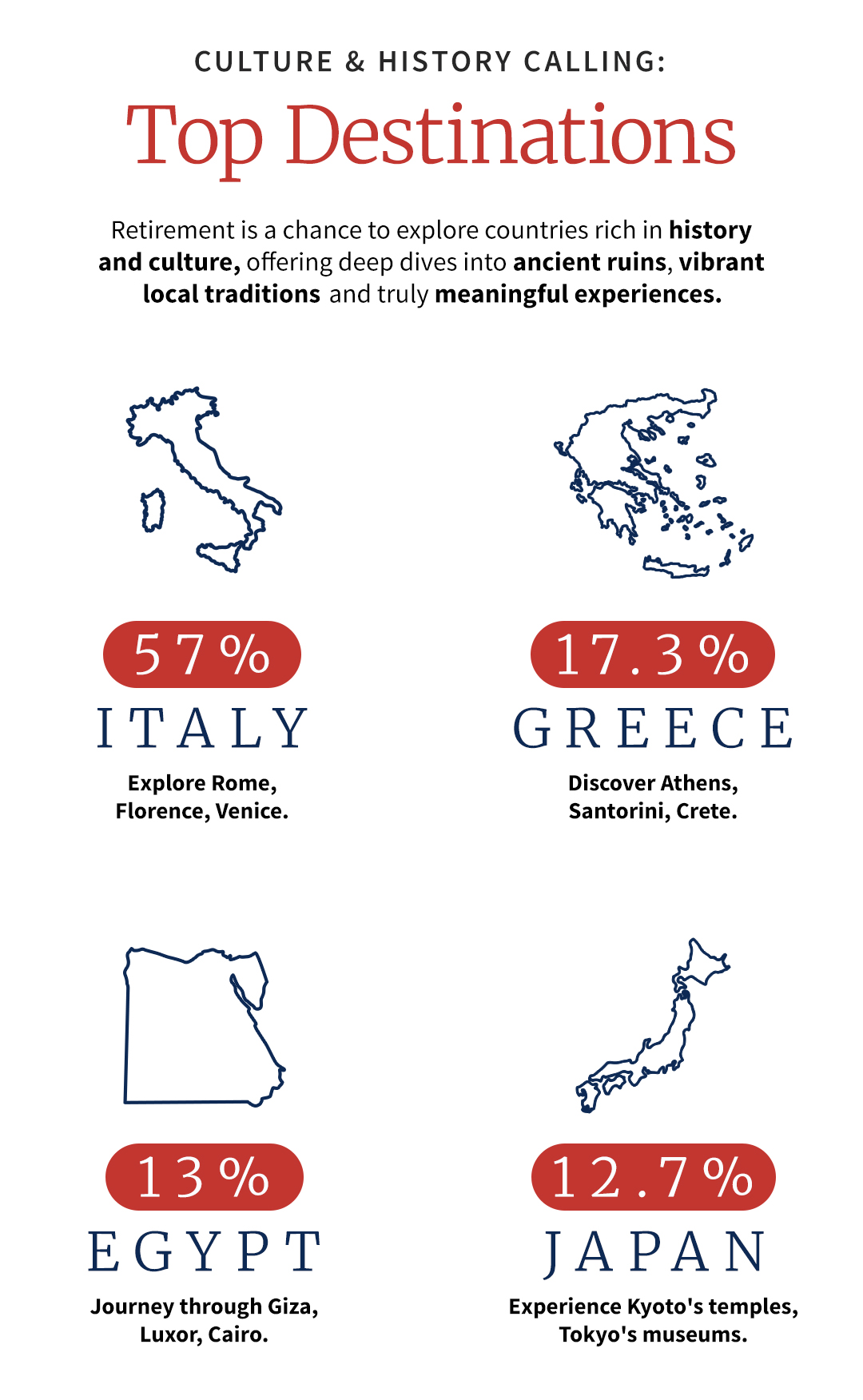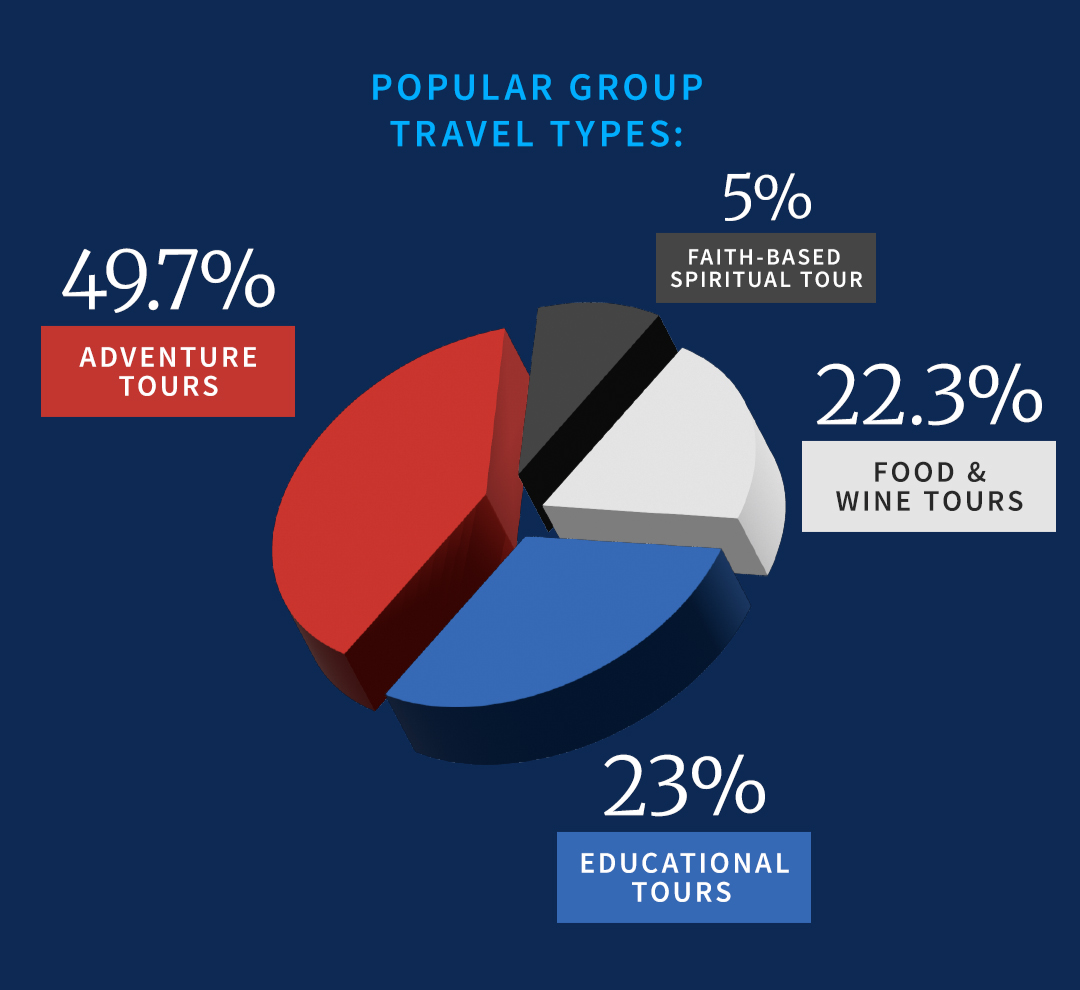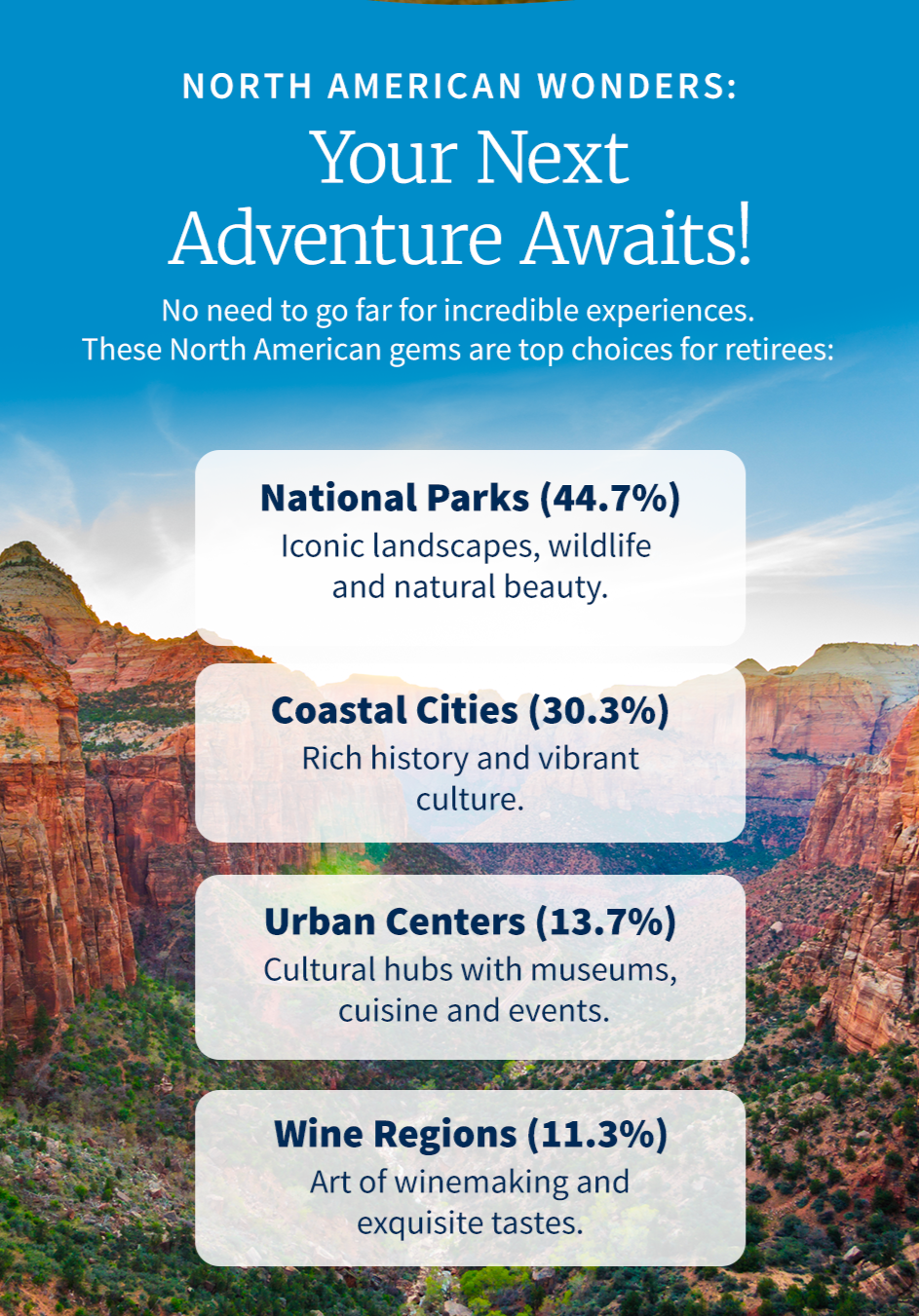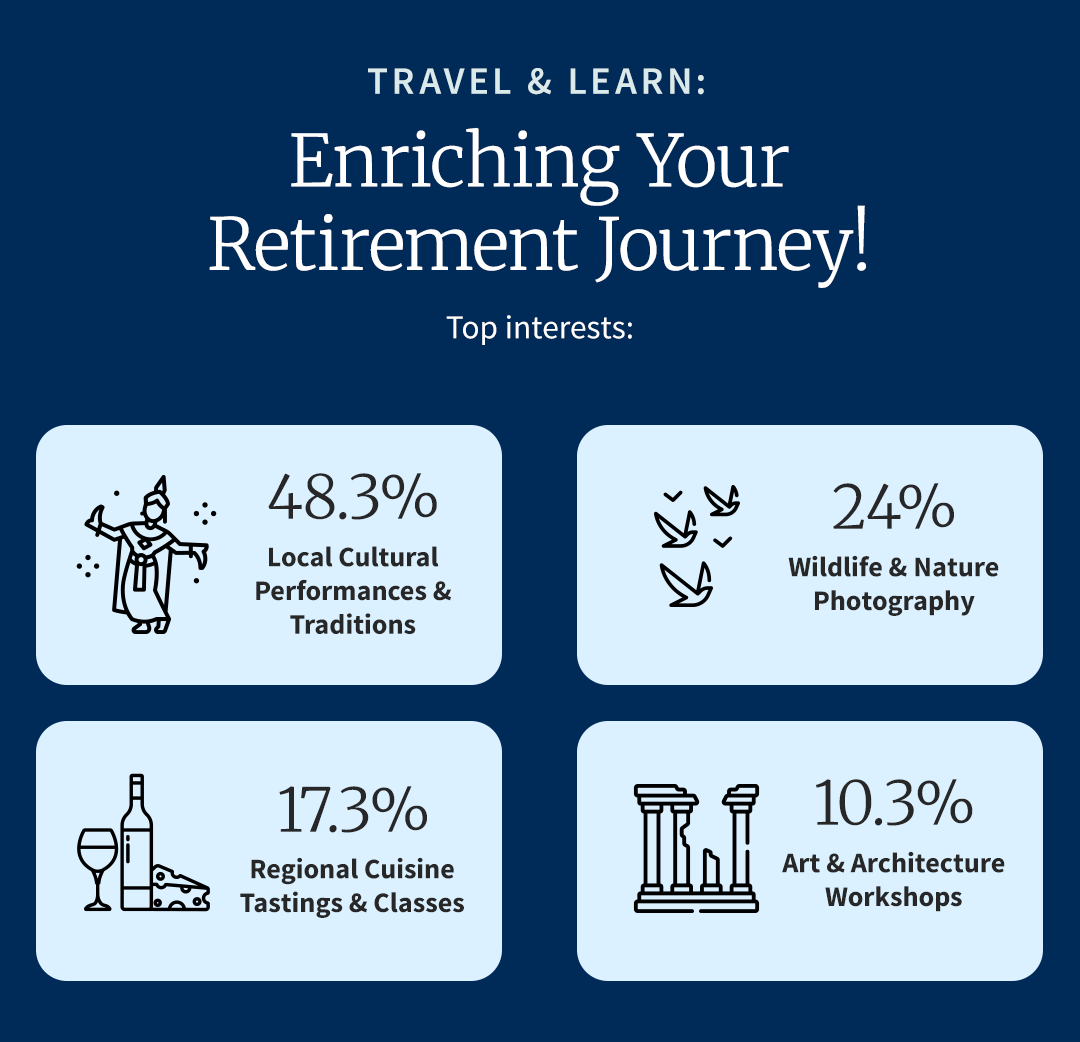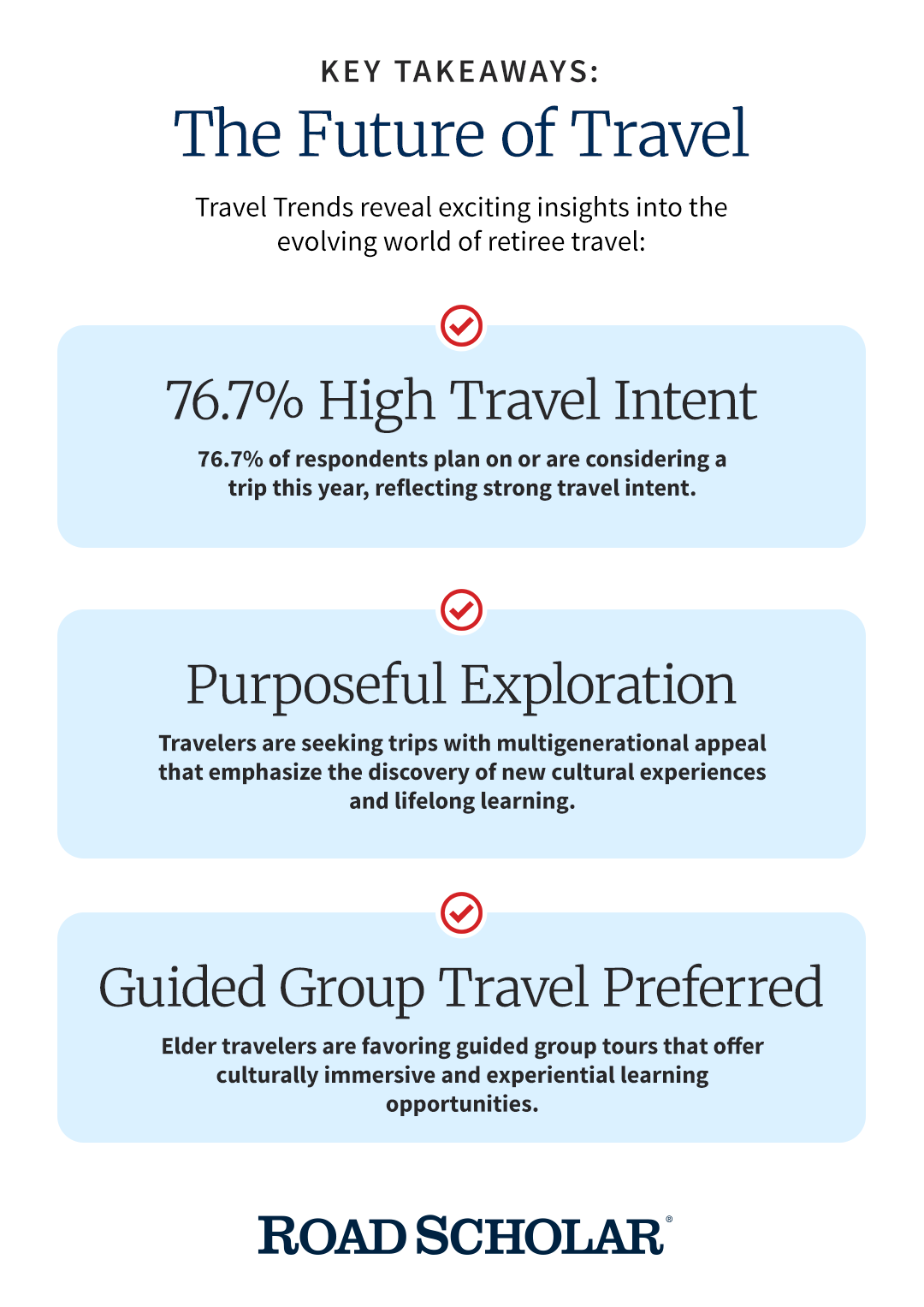2025 Retiree Travel Outlook: What the Latest Data Reveals
- Rules for Traveling in Retirement
-
- Choose guided tours
- Focus on historical sites
- Join local cultural experiences
- Top Travel Destinations Surveyed
- Italy (57%)
- Greece (17.3%)
- Egypt (13%)
- Japan (12.7%)
- Group Travel Planning
- Find reputable travel companies, like Road Scholar
- Check for local travel clubs
- Read reviews and compare
- Focus on travel budget planning
- Consider multigenerational adventures with family

Today’s retirees are embracing travel with a renewed sense of purpose and adventure, seeking out more enriching experiences that offer personal growth and wellness benefits. Our latest Thought Leader Survey unveiled some inspiring statistics centered around retiree travel for 2025.
To start, there’s an increasing interest in travel among retirees, who are aged 55 to 60 and above. This heightened interest is fueled by a desire for cultural exploration, group travel, exploring North American destinations, embarking on multigenerational trips and experiencing lifelong learning experiences during travel.
Travel for retirees offers a host of unique benefits, from meeting new people to immersing oneself in new cultures for a deeper, enriching life. Today, we explore traveling in retirement and what that means in the current travel landscape. If you’re looking to pack your bags and jetset around the globe, this guide will serve as an invaluable tool, helping you plan travel to ensure it aligns with your interests, needs and preferences and offering even more reasons to travel with Road Scholar.

Survey Insights: Cultural and Historical Exploration
The beauty of retiree travel is the newfound freedom, where seniors no longer need to worry about clocking into their 9 to 5 jobs. Instead, they can now reward their decades of hard work by doing something they truly love. For many, that’s travel. Retirement travel allows seniors to immerse themselves in new cultures and continue on a path of lifelong learning that keeps them engaged and connected with others around them. Based on our Thought Leader Survey, seniors are ready to pack their bags overseas to enjoy cultural and historical exploration opportunities. So, what are the most popular travel destinations for seniors? Take a look:
Italy
Overall, Italy serves as one of the favorite destinations among seniors interested in cultural and historical exploration, with 57% of respondents ranking Italy as their top choice. And that’s for good reason! Italy has a lot to offer its many visitors. Cities like Rome, Florence and Venice act as open-air museums with Renaissance art, Roman ruins and iconic architecture, such as the picturesque Duomo. Seniors can stroll ancient cobblestone streets, visit the Vatican and indulge in mouth-watering, traditional cuisine.
Greece
Next on our list of the top destinations for seniors interested in cultural and historical exploration is Greece, with 17.3% of survey respondents eager to explore areas like Athens, Santorini and Crete. With a laid-back Mediterranean atmosphere, Greece offers a slower, relaxed pace that’s perfect for seniors interested in spending their time exploring sites like the Acropolis in Athens or the Knossos Palace in Crete. Through these discoveries, seniors can gain a better understanding of Western civilization’s origins and the many developments that originated with Greek culture. Traveling in retirement to Greece offers a unique blend of historical sightseeing opportunities, offering scenic island hopping and quiet coastal stays, where hospitality and fresh cuisine are part of the allure.
Egypt
13% of survey respondents have Egypt on their list of places to go for retirement travel, and rightfully so. Egypt captivates visitors with its sheer scale of history, from the pyramids of Giza and temples of Luxor to the Nile River and the bustling city of Cairo. Seniors can enjoy river cruises that connect archaeological sites to gain a better understanding of one of the world’s oldest civilizations.
Japan
Rounding off our list of the top places for seniors to visit is Japan, with 12.7% of respondents interested in this country’s rich culture and history. Japan blends ancient traditions with modern ease, allowing seniors to explore sites like Kyoto’s temples, castles, and gardens or Tokyo’s museums and historic districts with reliable, fast, clean and safe transportation.
Seniors enjoy traveling in retirement to places like Italy, Greece, Egypt and Japan because these destinations offer a rich mix of history, culture and meaningful experiences. When setting foot onto the soil of these countries, seniors can stand where ancient civilizations once thrived, walking through ruins and seeing firsthand how the past still shapes daily life. These countries are home to many UNESCO World Heritage Sites, which means there’s no shortage of attractions to discover.
Think ancient temples, medieval towns, sacred shrines and grand monuments — all dotting the landscape of these regions, and all asking to be explored. But what really draws people in is the ability to slow down and connect with local traditions, whether it’s learning how to roll fresh pasta in a cooking class in Tuscany or cruising the Nile while hearing stories of pharaohs. For many older travelers, it’s more than just sightseeing. Travel allows for the opportunity to dive deeper, ask questions and connect with fellow lifelong learners to forge meaningful relationships.

So, let’s dive into some of the rules for traveling in retirement. There are several personalized travel tips based on our survey findings to ensure you make the most of your adventures.
Ways to tailor your cultural travel experiences:
Choose guided tours
Joining guided tours designed for seniors is an excellent way to uncover the hidden gems sprinkled throughout the area you’re looking to discover. Our expert and knowledgeable guides bring historical landmarks to life and are ready to answer any questions you may have. Guided tours for seniors are also held at a comfortable pace and take the stress out of planning logistics like transportation and lodging so that you can be fully present in your explorations.
Focus on historical sites
Many famous historical sites are accessible, such as those in Rome, Athens and Cairo, with ramps, lifts or alternative routes so that you can explore at your own preferred leisurely pace. Many of these sites have engaging visitor centers with exhibits and information, ensuring you have access to the history you’re looking for with the accommodations you need for a comfortable visit.
Join local cultural experiences
One of the best ways to have a truly unforgettable retirement travel experience is to include hands-on cultural experiences. Cooking classes, traditional craft workshops and music or dance demonstrations offer a personal connection to the destination’s culture, offering a great way to interact with locals and learn something new.
from survey"64.3% favor solo travel with flexible itineraries"
Group Travel and Companionship
Survey results show that companionship and group dynamics influence destination choices. Group travel to the best places to visit can be especially meaningful for retirees because it offers both companionship and peace of mind. Traveling with others brings a sense of community to the experience. When exploring ancient ruins or dining out, seniors can share these experiences with others to make the trip more enjoyable and less isolating.
Overall, 9.3% of survey respondents prefer group travel with guided tours, while a much larger 64.3% favor solo travel with flexible itineraries. However, solo travel doesn’t mean you have to experience travel on your own. Our Road Scholar programs welcome solo travelers into our group trips, offering flexible itineraries that allow time for both guided tours and independent exploration. Additionally, 44% of respondents, when choosing a destination, rated group travel companionship as somewhat or extremely important. This shows how important sharing travel experiences with others is for senior travelers.
Our survey also revealed that the type of group travel that interests survey respondents the most was:
- adventure tours with light physical activities (49.7%)
- educational tours focused on history or art (23%)
- food and wine group tours (22.3%)
- faith-based or spiritual tours (5%)
Another reason why retirees lean toward these travel types is their ability to enjoy curated experiences. Our local, knowledgeable guides bring travelers off the beaten path to enjoy one-of-a-kind travel experiences. Retirees can also connect with and meet like-minded individuals, finding they have a lot in common with fellow travelers.
For solo travelers, in particular, this kind of built-in social aspect can be a big part of why they choose group travel in the first place. The social aspect of traveling in retirement allows seniors to stay engaged and forge new relationships that last well beyond their travel experience.
How to Plan for Group Travel
There’s a lot to be excited about when it comes to retiree travel. However, there are several key rules for traveling in retirement to keep in mind. Here’s how to plan for group travel:
- Look for reputable travel companies like Road Scholar that specialize in senior travel, ensuring they offer well-reviewed programs designed for seniors.
- Check for local travel clubs that allow you to connect with others who share similar interests and pace.
- Consider multigenerational adventures if you’re planning on traveling with family, ensuring the program you choose offers activities for all ages that work for both older and younger travelers.
- Read reviews and compare itineraries that include downtime, accessible transportation and accommodations and small group tours.
- Focus on retirement travel budget planning to ensure you cover your finances for transportation, dining and activities.
- Keep our helpful travel tips for seniors in mind once your trip is booked.
North American Destinations
For seniors looking to stay a little closer to home, North America and the United States have a lot to offer. Based on our survey results, here are some of the top destinations in North America that seniors are interested in:
National parks
North America’s national parks are the most popular destinations for retiree travel, with 44.7% of seniors looking to explore these protected lands. From Yosemite and Yellowstone to Banff and Jasper, North America is home to pristine locations perfect for wildlife viewing and capturing unrivaled natural beauty.
Coastal cities
30.3% of survey respondents are eager to explore North America’s coastal cities, such as Charleston and Savannah, which are known for their rich history and vibrant culture
Urban centers
Next up are North America’s urban centers, such as Toronto, New York City, Los Angeles and Washington D.C., where 13.7% of retirees are interested in exploring. These cultural hubs offer travelers everything from knowledge-provoking museums to regional cuisine and seasonal events.
Wine regions
From our Travel Trends Survey, 11.3% of survey respondents find North America’s wine regions appealing, such as Napa Valley in California and the Finger Lakes region in New York. Here, seniors can understand the art of winemaking from expert sommeliers while imbibing on the fruits of their labor.
Suggestions for North American Trips
There are several unique North American trips for seniors to consider, including:
- Santa Fe, New Mexico:
Santa Fe is a gem for seniors interested in art, history and Native American culture. Here, retirees can find a combination of Pueblo, Spanish and Anglo influences in everything from architecture to local cuisine.
- Québec City, Canada:
Québec City feels like a slice of Europe without leaving North America, featuring cobblestone streets, historic stone buildings and French-speaking locals for a rich cultural experience.
- Boston, Massachusetts:
Travelers can step back in time and relive Revolutionary War era events by walking Boston’s Freedom Trail for a deep historical experience while also enjoying modern amenities and attractions like a harbor cruise or a stop at the Boston Public Garden.

Multigenerational Travel
Another trend in traveling in retirement is planning a trip with family. Multigenerational travel allows for various generations to explore new regions and cultures of the world together.
In fact, our Travel Trends Survey found that 42% of seniors plan on taking a multigenerational trip within the next year. There are many factors explaining the rise in multigenerational travel popularity, such as enhancing family bonds, creating lasting memories and giving back to younger generations.
There are several exciting benefits of multigenerational travel to consider, such as:
- Building relationships between grandparents and grandchildren through shared experiences like learning about new cultures together, enjoying an exciting activity like biking through Ireland’s countryside or swimming in the Mediterranean.
- Exploring destinations that appeal to all ages, ensuring all family members have the opportunity to discover a region that speaks to them and their interests.
- Learning new skills at a multigenerational level, encouraging each generation to share their own insights and personal experiences with one another to gain a keener perspective and foster individual growth.
- Finding educational tours that pique everyone’s interest.
To make the most of your multigenerational trip, careful planning is a must. To start, it’s important to select a destination that appeals to and offers experiences for everyone. This might mean resorts that offer activities for all ages or family-friendly tours. It also requires collaboration, allowing everyone, even children, the opportunity to share what they’d like to do and see. Lastly, the rules for traveling in retirement require you to allow yourself to enjoy the experience to the fullest extent, immersing yourself in the region’s culture and traditions while enjoying pure quality time with your loved ones.
Preferred Travel Seasons
Overall, summer is the time of year when retirees prefer to travel most, with 43.7% of survey respondents preferring this season. Spring (27%), fall (26%) and winter (3.3%) followed, with summer reigning supreme due to its warm temperatures and abundance of seasonal activities. Spring and fall, however, are hand-in-hand a close second, serving as excellent times to avoid peak summer heat and bustling crowds and explore popular cultural attractions. Finally, wintering in warm destinations helps travelers escape the cold and embrace new cultures and traditions.
The off-season can be a great time of year for seniors looking to travel. The shoulder seasons come with fewer crowds and generally better deals on lodging, transportation and activities.
These seasons also have captivating cultural experiences travelers can enjoy, such as Christmas markets in Europe or cultural festivals in Latin America.
When traveling, keeping seasonal weather considerations in mind is crucial. Spring is generally rainy, so waterproof and insulated footwear and clothing are a must. Summer calls for more breathable garments and sun protection, while wintering in colder climates requires plenty of layers for warmth.
Lifelong Learning During Travel
One of the benefits of retiree travel is the ability to partake in cultural activities like history tours and other learning experiences. Our Travel Trends Survey found the following learning experiences of most interest to seniors:
- Art and architecture workshops (10.3%)
- culinary classes and food tours (17.3%)
- local cultural performances or traditions (48.3%)
- wildlife and nature photography (24%)
These experiences enhance travel for retirees by offering personal growth and enrichment, along with the opportunity to connect with other lifelong learners through a shared experience. They also allow for intellectual engagement, skill development and the fulfillment of educational goals, helping seniors live rich and meaningful lives.
To find and book lifelong learning experiences, look no further than reputable travel companies like Road Scholar. Our team offers a number of reasons to travel with Road Scholar, the least of which is by taking the stress out of planning itineraries, activities, transportation and lodging so you can focus on the excitement of your travels. You’ll also have time for relaxation and exploration on your own terms to ensure you have the opportunity to recharge and explore what interests you most.
from survey"76.7% of retirees have planned or are looking to take a trip this year"
Conclusion
The Road Scholar 2025 Travel Trends Survey unveiled some exciting stats about the future of retiree travel this year. With 76.7% of retirees having planned or are looking to take a trip this year, there are a lot of destinations to consider. For many, that means cultural regions like Italy, Greece, Egypt and Japan, along with North American destinations like national parks and coastal cities. There’s also growing interest among retirees for cultural exploration, group travel, multigenerational trips and lifelong learning.
What do these trends reveal about the future of retiree travel? Mostly that seniors are eager to travel, and guided group travel is a preferred option. This means the travel industry will need to offer rich experiential learning programs that allow retirees to explore new cultures and learn something new.
With these insights in mind, it’s time for retirees to begin planning their next adventure. Road Scholar has an exciting collection of senior travel programs that span the globe. Our guides handle logistics, answer questions and keep things running smoothly, so that participants can enjoy their specific type of travel to the fullest.
Seniors can choose from those based on their preferred destination, interests and activity level. They can also enjoy the guidance of our professional guides, who offer rich insights into local cultures, history, wildlife and geography. Choose a destination and start traveling in retirement with a trusted travel organization like Road Scholar. Review some of our tools and resources, as well as other practical information, to ensure a seamless and enjoyable travel experience.

